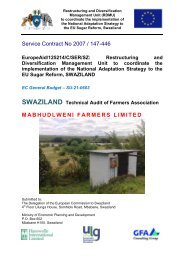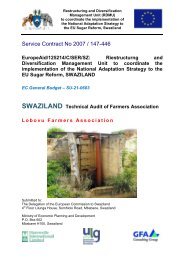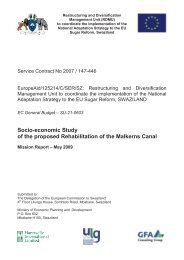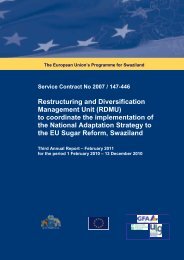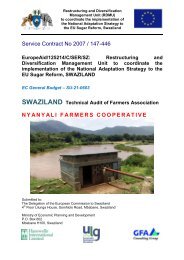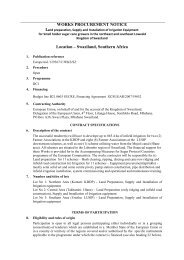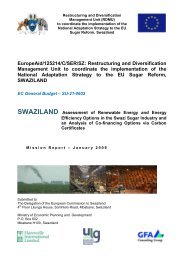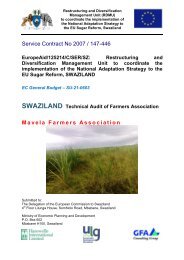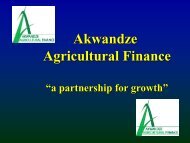Service Contract No 2007 / 147-446 Strategic ... - Swaziland
Service Contract No 2007 / 147-446 Strategic ... - Swaziland
Service Contract No 2007 / 147-446 Strategic ... - Swaziland
- No tags were found...
Create successful ePaper yourself
Turn your PDF publications into a flip-book with our unique Google optimized e-Paper software.
ooooMust be based on a basin-wide hydrological assessment of the water balancefor the Komati, Mbuluzi, Usuthu and Ngwavuma river basins;Must propose measures to be taken up by irrigators to improve their overallwater use efficiencies by moving from surface methods of irrigation to moreefficient sprinkler, centre pivot and drip systems;Must include recommendations on how to improve water governance at basinlevel; andMust include a sugar sector water footprint assessment (direct and operationalfootprint).Long-term social and environmental sustainability of small-cane growers- To evaluate the management models for small cane growers currently promoted bydevelopers (e.g. Millers and SWADE) and the <strong>Swaziland</strong> Sugar Association (SSA).An evaluation would comprise a SWOT analysis of current models, and comparingthe models with other options (such as co-operatives). Particular consideration needbe given to the feasibility of outsourcing the management of Farmers’ Associations(FAs), employing an outside private company to manage all the FAs in onedevelopment, such as in LUSIP and KDDP, and thus taking direct managementresponsibility away from the farmers themselves.The evaluation process would involve intense public participation at all levels, andparticularly with the farmers themselves. It would require a supplementary educationprocess, to ensure that the different options are presented before informed decisionsare made.- To strengthen the capacity building and training of farmers, particularly in skillsrelating to the entire managing of farms, individually and as part of a FA. One bodyneeds to be designated the task of monitoring training across-the-board in theprocess ensuring that the training offered is appropriate to the requirements offarmers, is of a high level, is standardised across the country, and is beingimplemented, reaching all those in need.- In order to address concerns around a ‘safety net’, to ensure social safeguardsagainst potential failure of sugar cane farming through allocating portions of land toalternative viable crops and livestock farming.- To undertake a cost-benefit analysis of the socio-economic impacts of increasedmechanisation on the sugar industry, particularly the potential change in the currentcost structure and the ultimate net return for the grower and income. Mechanisationwill have both positive and negative effects; it may reduce labour requirements (thusindirectly related to HIV/AIDS) and labour costs, yet result in higher investment inequipment and energy costs, and cause the loss of jobs and potentially increaselevels of poverty. Research into mechanisation would thus link in with broader socioeconomicimpacts.- In order to reduce energy costs, an energy efficiency audit for the small- and mediumscalegrowers should be undertaken to identify savings measures and equipment.Loss of biodiversity- The <strong>Swaziland</strong> Environment Authority (SEA) and the <strong>Swaziland</strong> National TrustCommission (SNTC), along with relevant stakeholders must develop a strategy toaddress the loss or degradation of biodiversity associated with an expanding sugarsector, the displacement of livestock and lack of compliance and monitoring for allsugar projects.RDMU (<strong>Strategic</strong> Environmental Assessment of the National Adaptation Strategy) - Page 7



